Comparative Analysis: Culture's Influence on Business in China, Japan
VerifiedAdded on 2021/07/20
|6
|1935
|816
Report
AI Summary
This report delves into the significant influence of national and organizational cultures on business operations, particularly focusing on China and Japan. It begins by defining culture and its impact, differentiating between national and organizational cultures, and highlighting their contrasting characteristics, such as the values-driven nature of national culture versus the practice-oriented nature of organizational culture. The report then examines China's business environment, emphasizing the impact of Confucianism, Guanxi, and the importance of relationships. It uses Hofstede's 6-D model to compare China and Germany, analyzing dimensions like Power Distance, Individualism, Masculinity, Uncertainty Avoidance, and Long-Term Orientation to highlight cultural nuances. Similarly, the report explores Japan's business culture, emphasizing relationship-oriented practices and the significance of silence, along with an analysis of cultural dimensions in comparison with Germany. The conclusion offers insights into the bottlenecks of doing business in both countries, comparing their advantages and disadvantages, and provides recommendations for businesses, such as focusing on establishing a factory in China for solar panels. The report concludes by emphasizing the importance of understanding cultural differences for global business success.
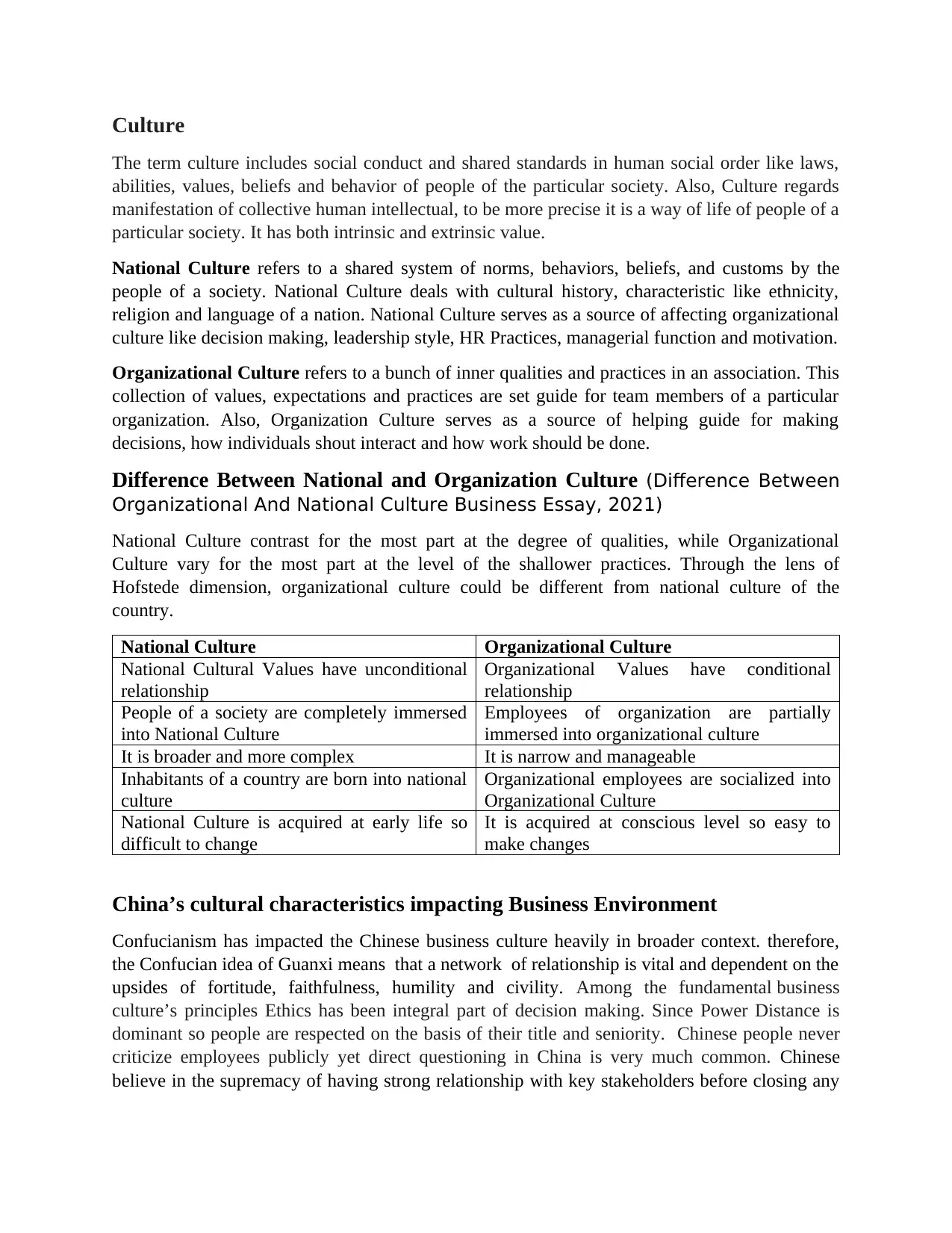
Culture
The term culture includes social conduct and shared standards in human social order like laws,
abilities, values, beliefs and behavior of people of the particular society. Also, Culture regards
manifestation of collective human intellectual, to be more precise it is a way of life of people of a
particular society. It has both intrinsic and extrinsic value.
National Culture refers to a shared system of norms, behaviors, beliefs, and customs by the
people of a society. National Culture deals with cultural history, characteristic like ethnicity,
religion and language of a nation. National Culture serves as a source of affecting organizational
culture like decision making, leadership style, HR Practices, managerial function and motivation.
Organizational Culture refers to a bunch of inner qualities and practices in an association. This
collection of values, expectations and practices are set guide for team members of a particular
organization. Also, Organization Culture serves as a source of helping guide for making
decisions, how individuals shout interact and how work should be done.
Difference Between National and Organization Culture (Difference Between
Organizational And National Culture Business Essay, 2021)
National Culture contrast for the most part at the degree of qualities, while Organizational
Culture vary for the most part at the level of the shallower practices. Through the lens of
Hofstede dimension, organizational culture could be different from national culture of the
country.
National Culture Organizational Culture
National Cultural Values have unconditional
relationship
Organizational Values have conditional
relationship
People of a society are completely immersed
into National Culture
Employees of organization are partially
immersed into organizational culture
It is broader and more complex It is narrow and manageable
Inhabitants of a country are born into national
culture
Organizational employees are socialized into
Organizational Culture
National Culture is acquired at early life so
difficult to change
It is acquired at conscious level so easy to
make changes
China’s cultural characteristics impacting Business Environment
Confucianism has impacted the Chinese business culture heavily in broader context. therefore,
the Confucian idea of Guanxi means that a network of relationship is vital and dependent on the
upsides of fortitude, faithfulness, humility and civility. Among the fundamental business
culture’s principles Ethics has been integral part of decision making. Since Power Distance is
dominant so people are respected on the basis of their title and seniority. Chinese people never
criticize employees publicly yet direct questioning in China is very much common. Chinese
believe in the supremacy of having strong relationship with key stakeholders before closing any
The term culture includes social conduct and shared standards in human social order like laws,
abilities, values, beliefs and behavior of people of the particular society. Also, Culture regards
manifestation of collective human intellectual, to be more precise it is a way of life of people of a
particular society. It has both intrinsic and extrinsic value.
National Culture refers to a shared system of norms, behaviors, beliefs, and customs by the
people of a society. National Culture deals with cultural history, characteristic like ethnicity,
religion and language of a nation. National Culture serves as a source of affecting organizational
culture like decision making, leadership style, HR Practices, managerial function and motivation.
Organizational Culture refers to a bunch of inner qualities and practices in an association. This
collection of values, expectations and practices are set guide for team members of a particular
organization. Also, Organization Culture serves as a source of helping guide for making
decisions, how individuals shout interact and how work should be done.
Difference Between National and Organization Culture (Difference Between
Organizational And National Culture Business Essay, 2021)
National Culture contrast for the most part at the degree of qualities, while Organizational
Culture vary for the most part at the level of the shallower practices. Through the lens of
Hofstede dimension, organizational culture could be different from national culture of the
country.
National Culture Organizational Culture
National Cultural Values have unconditional
relationship
Organizational Values have conditional
relationship
People of a society are completely immersed
into National Culture
Employees of organization are partially
immersed into organizational culture
It is broader and more complex It is narrow and manageable
Inhabitants of a country are born into national
culture
Organizational employees are socialized into
Organizational Culture
National Culture is acquired at early life so
difficult to change
It is acquired at conscious level so easy to
make changes
China’s cultural characteristics impacting Business Environment
Confucianism has impacted the Chinese business culture heavily in broader context. therefore,
the Confucian idea of Guanxi means that a network of relationship is vital and dependent on the
upsides of fortitude, faithfulness, humility and civility. Among the fundamental business
culture’s principles Ethics has been integral part of decision making. Since Power Distance is
dominant so people are respected on the basis of their title and seniority. Chinese people never
criticize employees publicly yet direct questioning in China is very much common. Chinese
believe in the supremacy of having strong relationship with key stakeholders before closing any
Paraphrase This Document
Need a fresh take? Get an instant paraphrase of this document with our AI Paraphraser
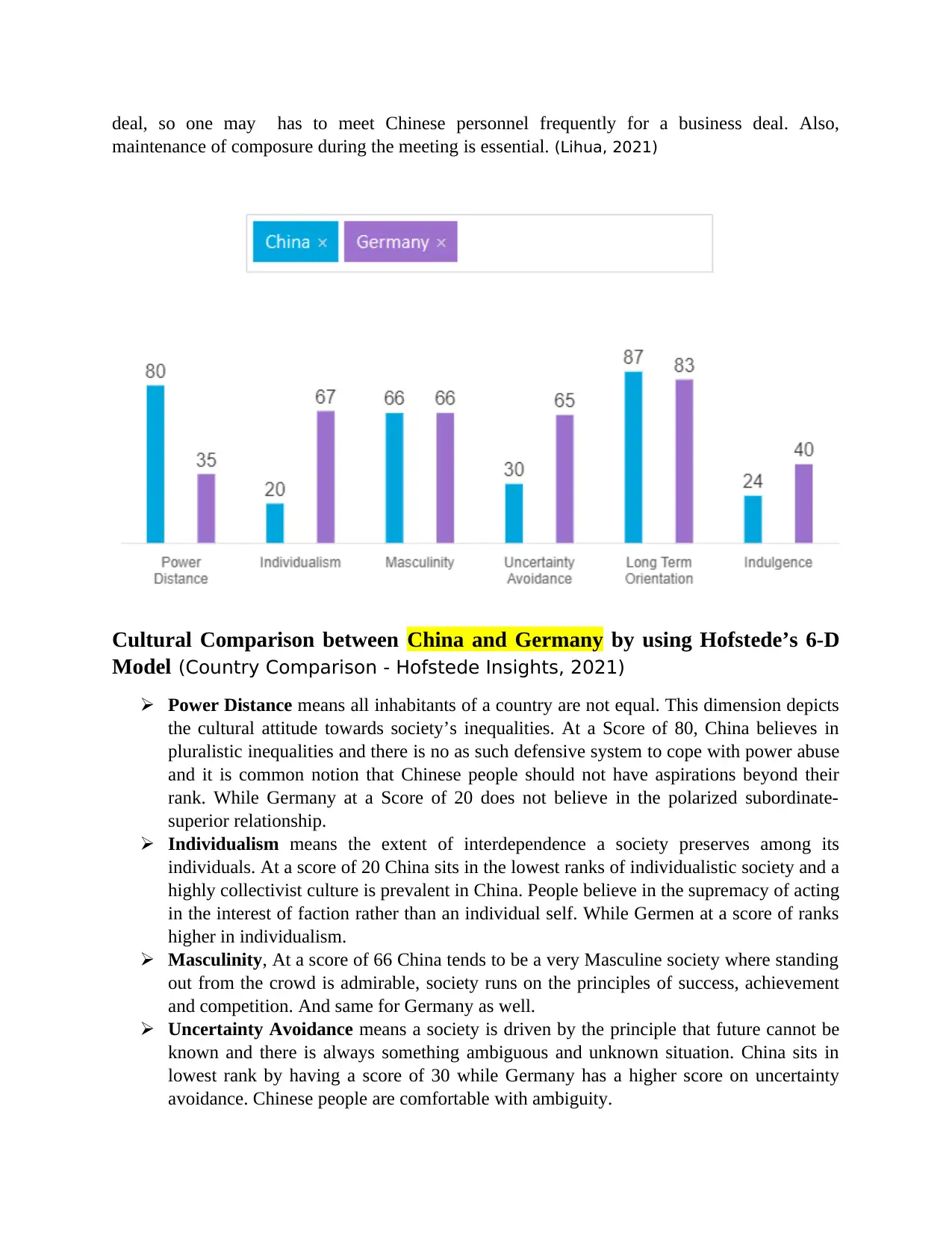
deal, so one may has to meet Chinese personnel frequently for a business deal. Also,
maintenance of composure during the meeting is essential. (Lihua, 2021)
Cultural Comparison between China and Germany by using Hofstede’s 6-D
Model (Country Comparison - Hofstede Insights, 2021)
Power Distance means all inhabitants of a country are not equal. This dimension depicts
the cultural attitude towards society’s inequalities. At a Score of 80, China believes in
pluralistic inequalities and there is no as such defensive system to cope with power abuse
and it is common notion that Chinese people should not have aspirations beyond their
rank. While Germany at a Score of 20 does not believe in the polarized subordinate-
superior relationship.
Individualism means the extent of interdependence a society preserves among its
individuals. At a score of 20 China sits in the lowest ranks of individualistic society and a
highly collectivist culture is prevalent in China. People believe in the supremacy of acting
in the interest of faction rather than an individual self. While Germen at a score of ranks
higher in individualism.
Masculinity, At a score of 66 China tends to be a very Masculine society where standing
out from the crowd is admirable, society runs on the principles of success, achievement
and competition. And same for Germany as well.
Uncertainty Avoidance means a society is driven by the principle that future cannot be
known and there is always something ambiguous and unknown situation. China sits in
lowest rank by having a score of 30 while Germany has a higher score on uncertainty
avoidance. Chinese people are comfortable with ambiguity.
maintenance of composure during the meeting is essential. (Lihua, 2021)
Cultural Comparison between China and Germany by using Hofstede’s 6-D
Model (Country Comparison - Hofstede Insights, 2021)
Power Distance means all inhabitants of a country are not equal. This dimension depicts
the cultural attitude towards society’s inequalities. At a Score of 80, China believes in
pluralistic inequalities and there is no as such defensive system to cope with power abuse
and it is common notion that Chinese people should not have aspirations beyond their
rank. While Germany at a Score of 20 does not believe in the polarized subordinate-
superior relationship.
Individualism means the extent of interdependence a society preserves among its
individuals. At a score of 20 China sits in the lowest ranks of individualistic society and a
highly collectivist culture is prevalent in China. People believe in the supremacy of acting
in the interest of faction rather than an individual self. While Germen at a score of ranks
higher in individualism.
Masculinity, At a score of 66 China tends to be a very Masculine society where standing
out from the crowd is admirable, society runs on the principles of success, achievement
and competition. And same for Germany as well.
Uncertainty Avoidance means a society is driven by the principle that future cannot be
known and there is always something ambiguous and unknown situation. China sits in
lowest rank by having a score of 30 while Germany has a higher score on uncertainty
avoidance. Chinese people are comfortable with ambiguity.
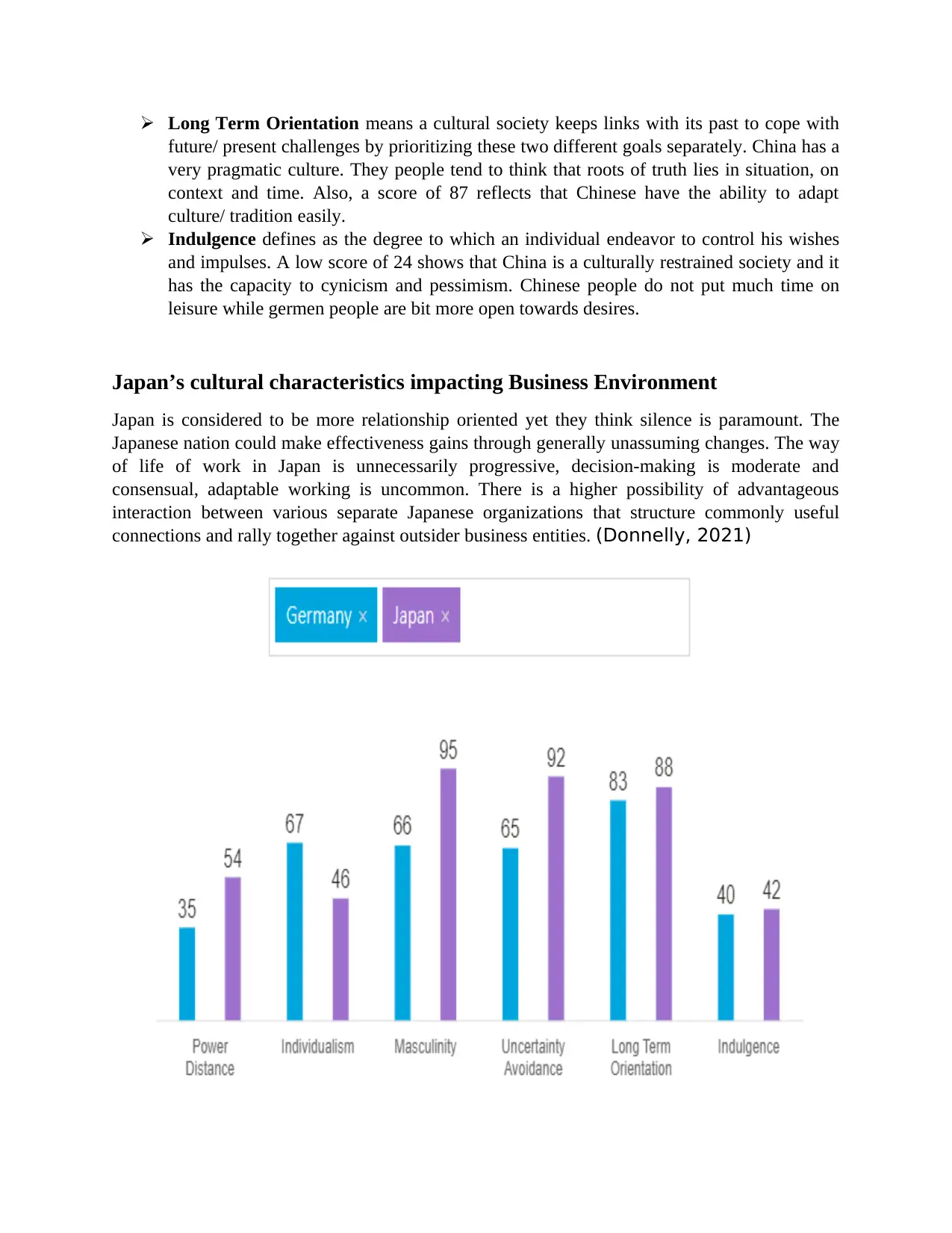
Long Term Orientation means a cultural society keeps links with its past to cope with
future/ present challenges by prioritizing these two different goals separately. China has a
very pragmatic culture. They people tend to think that roots of truth lies in situation, on
context and time. Also, a score of 87 reflects that Chinese have the ability to adapt
culture/ tradition easily.
Indulgence defines as the degree to which an individual endeavor to control his wishes
and impulses. A low score of 24 shows that China is a culturally restrained society and it
has the capacity to cynicism and pessimism. Chinese people do not put much time on
leisure while germen people are bit more open towards desires.
Japan’s cultural characteristics impacting Business Environment
Japan is considered to be more relationship oriented yet they think silence is paramount. The
Japanese nation could make effectiveness gains through generally unassuming changes. The way
of life of work in Japan is unnecessarily progressive, decision-making is moderate and
consensual, adaptable working is uncommon. There is a higher possibility of advantageous
interaction between various separate Japanese organizations that structure commonly useful
connections and rally together against outsider business entities. (Donnelly, 2021)
future/ present challenges by prioritizing these two different goals separately. China has a
very pragmatic culture. They people tend to think that roots of truth lies in situation, on
context and time. Also, a score of 87 reflects that Chinese have the ability to adapt
culture/ tradition easily.
Indulgence defines as the degree to which an individual endeavor to control his wishes
and impulses. A low score of 24 shows that China is a culturally restrained society and it
has the capacity to cynicism and pessimism. Chinese people do not put much time on
leisure while germen people are bit more open towards desires.
Japan’s cultural characteristics impacting Business Environment
Japan is considered to be more relationship oriented yet they think silence is paramount. The
Japanese nation could make effectiveness gains through generally unassuming changes. The way
of life of work in Japan is unnecessarily progressive, decision-making is moderate and
consensual, adaptable working is uncommon. There is a higher possibility of advantageous
interaction between various separate Japanese organizations that structure commonly useful
connections and rally together against outsider business entities. (Donnelly, 2021)
⊘ This is a preview!⊘
Do you want full access?
Subscribe today to unlock all pages.

Trusted by 1+ million students worldwide
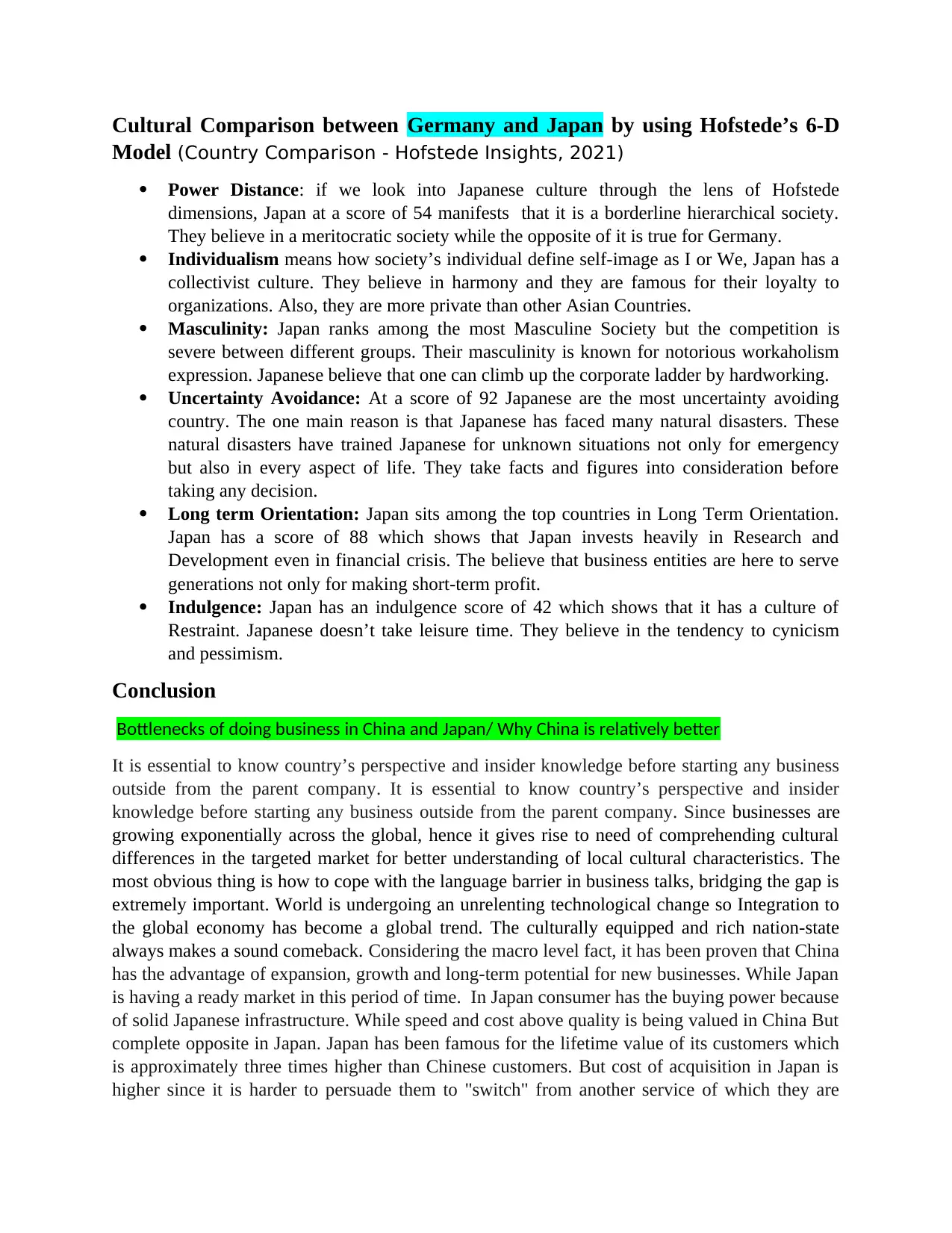
Cultural Comparison between Germany and Japan by using Hofstede’s 6-D
Model (Country Comparison - Hofstede Insights, 2021)
Power Distance: if we look into Japanese culture through the lens of Hofstede
dimensions, Japan at a score of 54 manifests that it is a borderline hierarchical society.
They believe in a meritocratic society while the opposite of it is true for Germany.
Individualism means how society’s individual define self-image as I or We, Japan has a
collectivist culture. They believe in harmony and they are famous for their loyalty to
organizations. Also, they are more private than other Asian Countries.
Masculinity: Japan ranks among the most Masculine Society but the competition is
severe between different groups. Their masculinity is known for notorious workaholism
expression. Japanese believe that one can climb up the corporate ladder by hardworking.
Uncertainty Avoidance: At a score of 92 Japanese are the most uncertainty avoiding
country. The one main reason is that Japanese has faced many natural disasters. These
natural disasters have trained Japanese for unknown situations not only for emergency
but also in every aspect of life. They take facts and figures into consideration before
taking any decision.
Long term Orientation: Japan sits among the top countries in Long Term Orientation.
Japan has a score of 88 which shows that Japan invests heavily in Research and
Development even in financial crisis. The believe that business entities are here to serve
generations not only for making short-term profit.
Indulgence: Japan has an indulgence score of 42 which shows that it has a culture of
Restraint. Japanese doesn’t take leisure time. They believe in the tendency to cynicism
and pessimism.
Conclusion
Bottlenecks of doing business in China and Japan/ Why China is relatively better
It is essential to know country’s perspective and insider knowledge before starting any business
outside from the parent company. It is essential to know country’s perspective and insider
knowledge before starting any business outside from the parent company. Since businesses are
growing exponentially across the global, hence it gives rise to need of comprehending cultural
differences in the targeted market for better understanding of local cultural characteristics. The
most obvious thing is how to cope with the language barrier in business talks, bridging the gap is
extremely important. World is undergoing an unrelenting technological change so Integration to
the global economy has become a global trend. The culturally equipped and rich nation-state
always makes a sound comeback. Considering the macro level fact, it has been proven that China
has the advantage of expansion, growth and long-term potential for new businesses. While Japan
is having a ready market in this period of time. In Japan consumer has the buying power because
of solid Japanese infrastructure. While speed and cost above quality is being valued in China But
complete opposite in Japan. Japan has been famous for the lifetime value of its customers which
is approximately three times higher than Chinese customers. But cost of acquisition in Japan is
higher since it is harder to persuade them to "switch" from another service of which they are
Model (Country Comparison - Hofstede Insights, 2021)
Power Distance: if we look into Japanese culture through the lens of Hofstede
dimensions, Japan at a score of 54 manifests that it is a borderline hierarchical society.
They believe in a meritocratic society while the opposite of it is true for Germany.
Individualism means how society’s individual define self-image as I or We, Japan has a
collectivist culture. They believe in harmony and they are famous for their loyalty to
organizations. Also, they are more private than other Asian Countries.
Masculinity: Japan ranks among the most Masculine Society but the competition is
severe between different groups. Their masculinity is known for notorious workaholism
expression. Japanese believe that one can climb up the corporate ladder by hardworking.
Uncertainty Avoidance: At a score of 92 Japanese are the most uncertainty avoiding
country. The one main reason is that Japanese has faced many natural disasters. These
natural disasters have trained Japanese for unknown situations not only for emergency
but also in every aspect of life. They take facts and figures into consideration before
taking any decision.
Long term Orientation: Japan sits among the top countries in Long Term Orientation.
Japan has a score of 88 which shows that Japan invests heavily in Research and
Development even in financial crisis. The believe that business entities are here to serve
generations not only for making short-term profit.
Indulgence: Japan has an indulgence score of 42 which shows that it has a culture of
Restraint. Japanese doesn’t take leisure time. They believe in the tendency to cynicism
and pessimism.
Conclusion
Bottlenecks of doing business in China and Japan/ Why China is relatively better
It is essential to know country’s perspective and insider knowledge before starting any business
outside from the parent company. It is essential to know country’s perspective and insider
knowledge before starting any business outside from the parent company. Since businesses are
growing exponentially across the global, hence it gives rise to need of comprehending cultural
differences in the targeted market for better understanding of local cultural characteristics. The
most obvious thing is how to cope with the language barrier in business talks, bridging the gap is
extremely important. World is undergoing an unrelenting technological change so Integration to
the global economy has become a global trend. The culturally equipped and rich nation-state
always makes a sound comeback. Considering the macro level fact, it has been proven that China
has the advantage of expansion, growth and long-term potential for new businesses. While Japan
is having a ready market in this period of time. In Japan consumer has the buying power because
of solid Japanese infrastructure. While speed and cost above quality is being valued in China But
complete opposite in Japan. Japan has been famous for the lifetime value of its customers which
is approximately three times higher than Chinese customers. But cost of acquisition in Japan is
higher since it is harder to persuade them to "switch" from another service of which they are
Paraphrase This Document
Need a fresh take? Get an instant paraphrase of this document with our AI Paraphraser
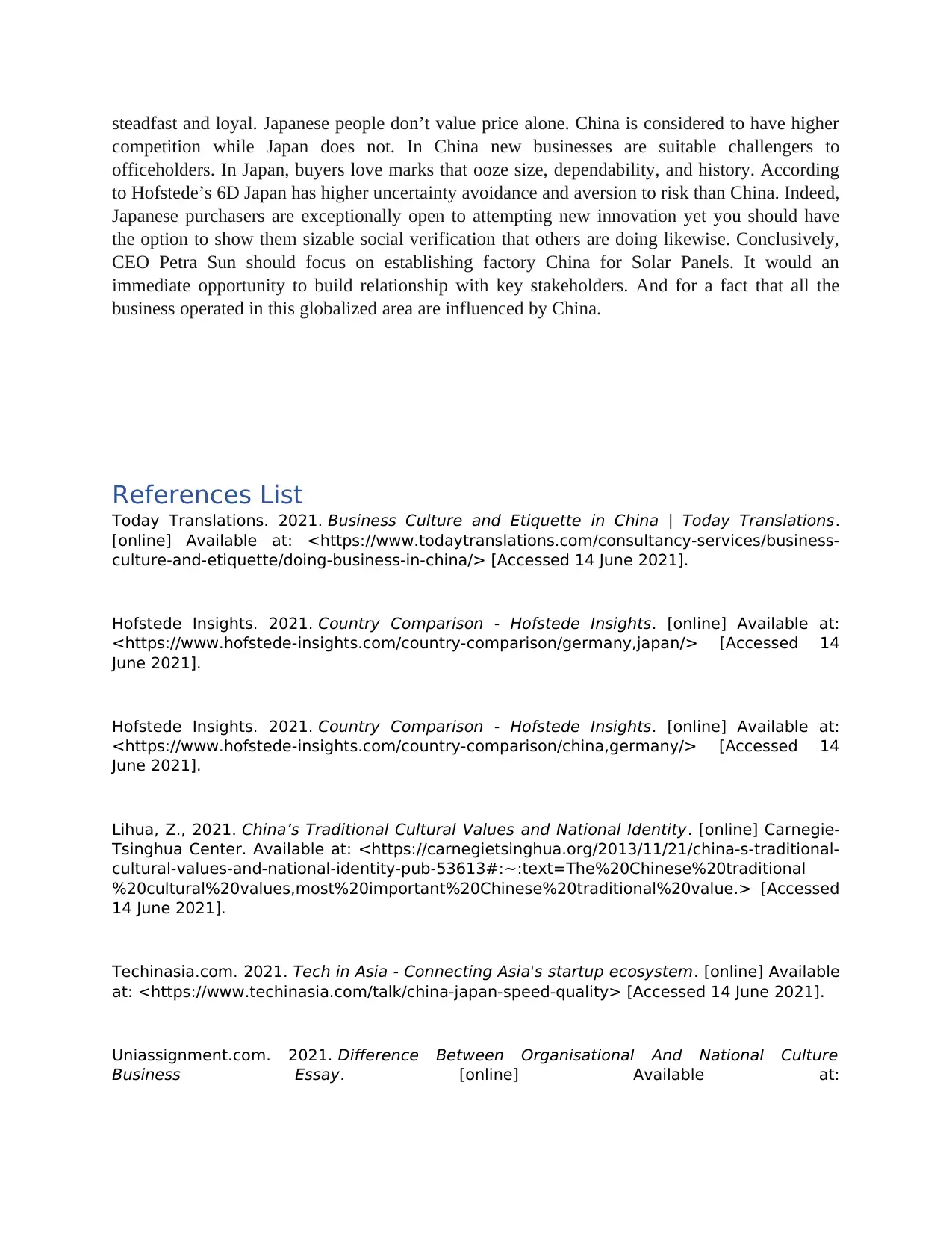
steadfast and loyal. Japanese people don’t value price alone. China is considered to have higher
competition while Japan does not. In China new businesses are suitable challengers to
officeholders. In Japan, buyers love marks that ooze size, dependability, and history. According
to Hofstede’s 6D Japan has higher uncertainty avoidance and aversion to risk than China. Indeed,
Japanese purchasers are exceptionally open to attempting new innovation yet you should have
the option to show them sizable social verification that others are doing likewise. Conclusively,
CEO Petra Sun should focus on establishing factory China for Solar Panels. It would an
immediate opportunity to build relationship with key stakeholders. And for a fact that all the
business operated in this globalized area are influenced by China.
References List
Today Translations. 2021. Business Culture and Etiquette in China | Today Translations.
[online] Available at: <https://www.todaytranslations.com/consultancy-services/business-
culture-and-etiquette/doing-business-in-china/> [Accessed 14 June 2021].
Hofstede Insights. 2021. Country Comparison - Hofstede Insights. [online] Available at:
<https://www.hofstede-insights.com/country-comparison/germany,japan/> [Accessed 14
June 2021].
Hofstede Insights. 2021. Country Comparison - Hofstede Insights. [online] Available at:
<https://www.hofstede-insights.com/country-comparison/china,germany/> [Accessed 14
June 2021].
Lihua, Z., 2021. China’s Traditional Cultural Values and National Identity. [online] Carnegie-
Tsinghua Center. Available at: <https://carnegietsinghua.org/2013/11/21/china-s-traditional-
cultural-values-and-national-identity-pub-53613#:~:text=The%20Chinese%20traditional
%20cultural%20values,most%20important%20Chinese%20traditional%20value.> [Accessed
14 June 2021].
Techinasia.com. 2021. Tech in Asia - Connecting Asia's startup ecosystem. [online] Available
at: <https://www.techinasia.com/talk/china-japan-speed-quality> [Accessed 14 June 2021].
Uniassignment.com. 2021. Difference Between Organisational And National Culture
Business Essay. [online] Available at:
competition while Japan does not. In China new businesses are suitable challengers to
officeholders. In Japan, buyers love marks that ooze size, dependability, and history. According
to Hofstede’s 6D Japan has higher uncertainty avoidance and aversion to risk than China. Indeed,
Japanese purchasers are exceptionally open to attempting new innovation yet you should have
the option to show them sizable social verification that others are doing likewise. Conclusively,
CEO Petra Sun should focus on establishing factory China for Solar Panels. It would an
immediate opportunity to build relationship with key stakeholders. And for a fact that all the
business operated in this globalized area are influenced by China.
References List
Today Translations. 2021. Business Culture and Etiquette in China | Today Translations.
[online] Available at: <https://www.todaytranslations.com/consultancy-services/business-
culture-and-etiquette/doing-business-in-china/> [Accessed 14 June 2021].
Hofstede Insights. 2021. Country Comparison - Hofstede Insights. [online] Available at:
<https://www.hofstede-insights.com/country-comparison/germany,japan/> [Accessed 14
June 2021].
Hofstede Insights. 2021. Country Comparison - Hofstede Insights. [online] Available at:
<https://www.hofstede-insights.com/country-comparison/china,germany/> [Accessed 14
June 2021].
Lihua, Z., 2021. China’s Traditional Cultural Values and National Identity. [online] Carnegie-
Tsinghua Center. Available at: <https://carnegietsinghua.org/2013/11/21/china-s-traditional-
cultural-values-and-national-identity-pub-53613#:~:text=The%20Chinese%20traditional
%20cultural%20values,most%20important%20Chinese%20traditional%20value.> [Accessed
14 June 2021].
Techinasia.com. 2021. Tech in Asia - Connecting Asia's startup ecosystem. [online] Available
at: <https://www.techinasia.com/talk/china-japan-speed-quality> [Accessed 14 June 2021].
Uniassignment.com. 2021. Difference Between Organisational And National Culture
Business Essay. [online] Available at:

<https://www.uniassignment.com/essay-samples/business/difference-between-
organisational-and-national-culture-business-essay.php> [Accessed 14 June 2021].
Donnelly, D., 2021. Japan Business Culture | 5 Things You Should Know. [online] New
Horizons Global Partners. Available at: <https://nhglobalpartners.com/japan-business-
culture-five-things-you-should-know/> [Accessed 14 June 2021].
organisational-and-national-culture-business-essay.php> [Accessed 14 June 2021].
Donnelly, D., 2021. Japan Business Culture | 5 Things You Should Know. [online] New
Horizons Global Partners. Available at: <https://nhglobalpartners.com/japan-business-
culture-five-things-you-should-know/> [Accessed 14 June 2021].
⊘ This is a preview!⊘
Do you want full access?
Subscribe today to unlock all pages.

Trusted by 1+ million students worldwide
1 out of 6
Related Documents
Your All-in-One AI-Powered Toolkit for Academic Success.
+13062052269
info@desklib.com
Available 24*7 on WhatsApp / Email
![[object Object]](/_next/static/media/star-bottom.7253800d.svg)
Unlock your academic potential
Copyright © 2020–2025 A2Z Services. All Rights Reserved. Developed and managed by ZUCOL.





